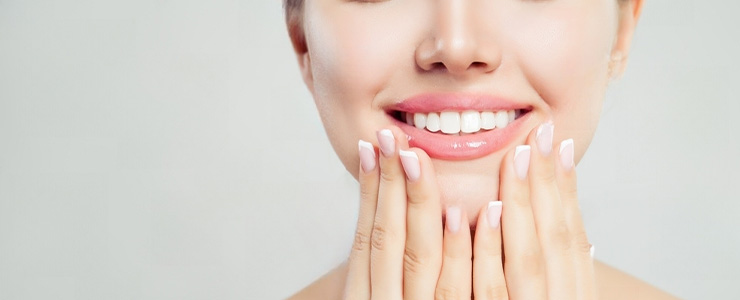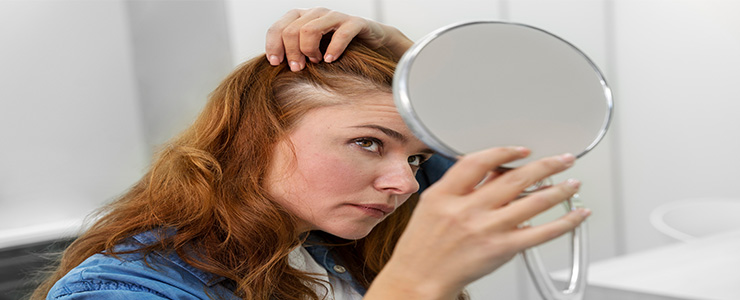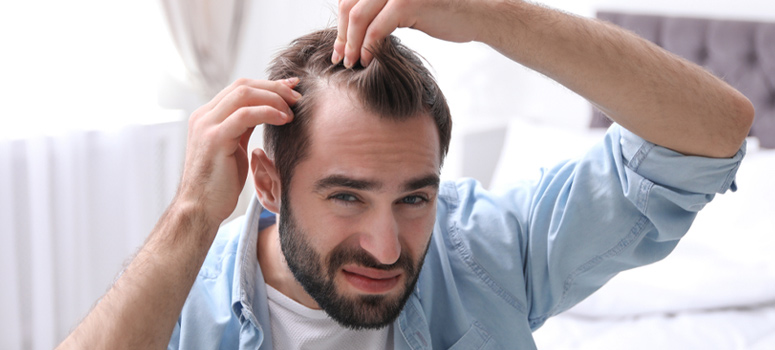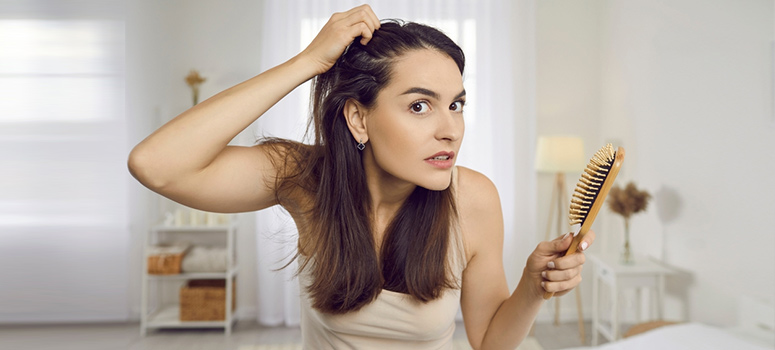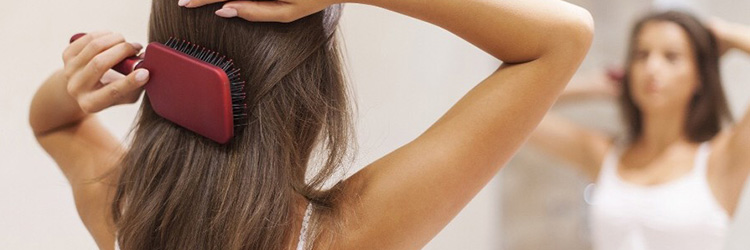Coping with hair fall and hair loss can mean different things to different people. A large portion of the male population is unaware when it comes to noticing early signs of hair loss and what to do about it.
Male pattern baldness or Androgenetic Alopecia is a common occurrence in men. This hereditary hair condition affects nearly half of the male populace and happens over a period of time.
Therefore, as the adage goes, prevention is better than cure. The earlier you are able to spot the signs of baldness and take appropriate action, the greater your chances of saving yourself from hair loss.
Read on to find out some hair fall solutions and treatment options to prevent your hair from thinning. First off, let’s look at some tell-tale signs that indicate hair fall in men.
Early Signs of Hair Fall in Men
If you suspect that you have hair loss, look out for these early signs of hair fall in men:
- Changes in Hairline
One of the ways to spot the first signs of androgenetic alopecia is to examine if there are any changes in your hairline.To confirm that you are going through baldness, try taking pictures of your hair from above every few months and then compare the pictures. Usually, you will notice thinning of hair and empty spaces on your scalp where previously you had voluminous hair.
- Thinning Hair
Another early sign of baldness can be thinning of hair. Not all men experience baldness that begins with a receding hairline. Some men experience what is known as diffuse thinning.If you notice that your hair is thinner than usual, especially around your temples or crown, then you may be experiencing baldness and should seek medical attention right away.
- Losing Hair After Showering or Combing
You will notice that you usually lose hair right after washing your hair or brushing and combing your hair. It is a normal phenomenon to lose around 50-100 strands of hair each day, but any number more than that is cause for concern.A warning sign of hair loss is losing an immoderate amount of hair than usual, especially during activities like showering or brushing. If it is a one-off incident due to stress or side effects of medication, then there is no reason to get anxious. Speak to your healthcare provider to adjust your dose or change your medicine to combat the side effects.However, if you notice that you’ve been losing an excessive amount of hair over a period of time, you may want to consider seeking professional help at the earliest.
Causes of Hair Loss in Men
Despite being mostly genetic in nature, hair loss can be induced by a variety of factors. Here are some of the prevalent reasons for hair fall in men:
- Stress
One of the biggest problems that plague us and can have serious implications on our health is stress. Stress has been known to induce various hair loss conditions such as telogen effluvium and male pattern baldness.As a result, it is necessary to keep your stress levels in check to prevent hair fall and other problems. If you’re unable to deal with everyday stress, it’s wise to seek professional help.
- Medical Ailments
A variety of medical ailments can lead to hair loss. Some have direct effects on your hair, whereas others have indirect effects. Conditions such as hypothyroidism, diabetes, and other skin infections can result in hair loss and affect hair quality as well.
- Ageing
Hair loss is often concomitant with age. After reaching 30-35 years of age, hair usually starts thinning, and growth also reduces. Due to ageing, your hair also tends to become weak and starts graying.
- Dandruff
Dandruff is one of the indirect reasons for hair loss in men. Dry and flaky skin on the scalp can trigger itchiness, which in turn leads to scratching. Scratching is deleterious to your hair follicles and can result in hair loss.
- Leading an unhealthy Lifestyle
Having an unchecked lifestyle can have serious repercussions on your health, including hair loss. Poor diet habits have been linked to causing hair loss, as have smoking and drinking excessively.
Solutions for Hair Fall
Let’s look at some common and effective hair fall solutions for men:
- PRP Treatment
PRP or platelet-rich plasma for hair loss is a natural procedure that entails using one’s own plasma for hair growth. Plasma is replete with platelets and necessary nutrients that invigorate your hair follicles, helping them become stronger.
- Hair Transplant
If you’re experiencing severe hair loss, you may consider getting a hair transplant. The two most sought-after hair transplants for men are:
- Follicular Unit Transplantation (FUT): In this technique, a strip of tissue is taken from the back of your head and transplanted onto the scalp.
- Follicular Unit Extraction (FUE): This is a modern hair transplantation method where individual hair follicles are implanted on the head.
- Dermatological Treatments
Today, a variety of medications and dermatological treatments are available. The most popular among them for hair fall are minoxidil and finasteride.
- Minoxidil: This topical treatment is helpful in treating baldness and hair loss in men. The application of minoxidil increases blood circulation and nourishes your hair follicles resulting in hair growth.
- Finasteride: This hair loss solution works by reducing DHT levels, a hormone that can damage your hair follicles. Finasteride is administered orally.
- Oils and Massage
Essential oils such as rosemary peppermint oil can aid in hair growth. Massaging your scalp with pure cold-pressed coconut oil or olive oil can also help in reducing hair loss and stimulating hair growth. A few minutes of scalp massage every day can stimulate your hair follicles, resulting in thicker and more hair.
In Conclusion
If you notice signs of baldness and hair loss, do not ignore them and seek medical advice right away. Take pictures of your hair every few months and compare the pictures to identify whether you have any hair fall issues.
Due to factors such as aging, environmental pollution, and genetics, you may not be able to halt hair fall completely. However, you can prevent severe hair loss if you seek early treatment.
For other effective solutions and treatment options for hair loss, visit Skin and Hair Academy today.

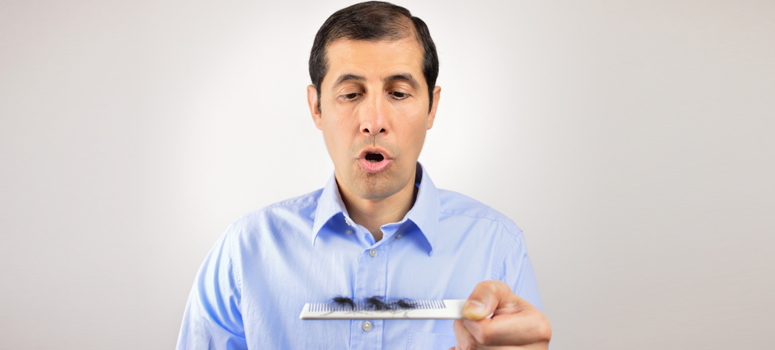
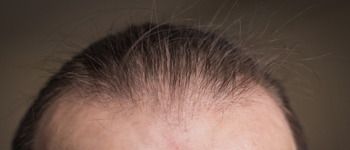 One of the ways to spot the first signs of
One of the ways to spot the first signs of 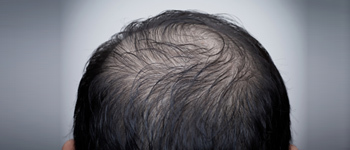 Another early sign of baldness can be thinning of hair. Not all men experience baldness that begins with a receding hairline. Some men experience what is known as diffuse thinning.If you notice that your hair is thinner than usual, especially around your temples or crown, then you may be experiencing baldness and should seek medical attention right away.
Another early sign of baldness can be thinning of hair. Not all men experience baldness that begins with a receding hairline. Some men experience what is known as diffuse thinning.If you notice that your hair is thinner than usual, especially around your temples or crown, then you may be experiencing baldness and should seek medical attention right away.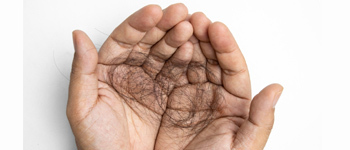 You will notice that you usually lose hair right after washing your hair or brushing and combing your hair. It is a normal phenomenon to lose around 50-100 strands of hair each day, but any number more than that is cause for concern.A warning sign of hair loss is losing an immoderate amount of hair than usual, especially during activities like showering or brushing. If it is a one-off incident due to stress or side effects of medication, then there is no reason to get anxious. Speak to your healthcare provider to adjust your dose or change your medicine to combat the side effects.However, if you notice that you’ve been losing an excessive amount of hair over a period of time, you may want to consider seeking professional help at the earliest.
You will notice that you usually lose hair right after washing your hair or brushing and combing your hair. It is a normal phenomenon to lose around 50-100 strands of hair each day, but any number more than that is cause for concern.A warning sign of hair loss is losing an immoderate amount of hair than usual, especially during activities like showering or brushing. If it is a one-off incident due to stress or side effects of medication, then there is no reason to get anxious. Speak to your healthcare provider to adjust your dose or change your medicine to combat the side effects.However, if you notice that you’ve been losing an excessive amount of hair over a period of time, you may want to consider seeking professional help at the earliest. One of the biggest problems that plague us and can have serious implications on our health is stress. Stress has been known to induce various hair loss conditions such as telogen effluvium and male pattern baldness.As a result, it is necessary to keep your stress levels in check to prevent hair fall and other problems. If you’re unable to deal with everyday stress, it’s wise to seek professional help.
One of the biggest problems that plague us and can have serious implications on our health is stress. Stress has been known to induce various hair loss conditions such as telogen effluvium and male pattern baldness.As a result, it is necessary to keep your stress levels in check to prevent hair fall and other problems. If you’re unable to deal with everyday stress, it’s wise to seek professional help. A variety of medical ailments can lead to hair loss. Some have direct effects on your hair, whereas others have indirect effects. Conditions such as hypothyroidism, diabetes, and other skin infections can result in hair loss and affect hair quality as well.
A variety of medical ailments can lead to hair loss. Some have direct effects on your hair, whereas others have indirect effects. Conditions such as hypothyroidism, diabetes, and other skin infections can result in hair loss and affect hair quality as well. Hair loss is often concomitant with age. After reaching 30-35 years of age, hair usually starts thinning, and growth also reduces. Due to ageing, your hair also tends to become weak and starts graying.
Hair loss is often concomitant with age. After reaching 30-35 years of age, hair usually starts thinning, and growth also reduces. Due to ageing, your hair also tends to become weak and starts graying. Dandruff is one of the indirect reasons for hair loss in men. Dry and flaky skin on the scalp can trigger itchiness, which in turn leads to scratching. Scratching is deleterious to your
Dandruff is one of the indirect reasons for hair loss in men. Dry and flaky skin on the scalp can trigger itchiness, which in turn leads to scratching. Scratching is deleterious to your  Having an unchecked lifestyle can have serious repercussions on your health, including hair loss. Poor diet habits have been linked to causing hair loss, as have smoking and drinking excessively.
Having an unchecked lifestyle can have serious repercussions on your health, including hair loss. Poor diet habits have been linked to causing hair loss, as have smoking and drinking excessively.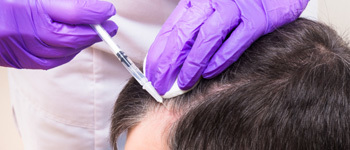 PRP or
PRP or 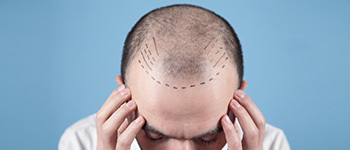 If you’re experiencing severe hair loss, you may consider getting a hair transplant. The two most sought-after
If you’re experiencing severe hair loss, you may consider getting a hair transplant. The two most sought-after 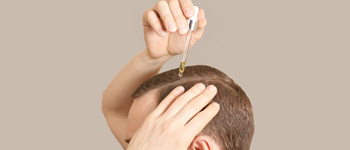 Today, a variety of medications and dermatological treatments are available. The most popular among them for hair fall are minoxidil and finasteride.
Today, a variety of medications and dermatological treatments are available. The most popular among them for hair fall are minoxidil and finasteride.
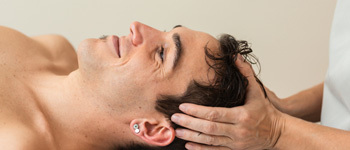 Essential oils such as rosemary peppermint oil can aid in hair growth. Massaging your scalp with pure cold-pressed coconut oil or olive oil can also help in reducing hair loss and stimulating hair growth. A few minutes of scalp massage every day can stimulate your hair follicles, resulting in thicker and more hair.
Essential oils such as rosemary peppermint oil can aid in hair growth. Massaging your scalp with pure cold-pressed coconut oil or olive oil can also help in reducing hair loss and stimulating hair growth. A few minutes of scalp massage every day can stimulate your hair follicles, resulting in thicker and more hair.


